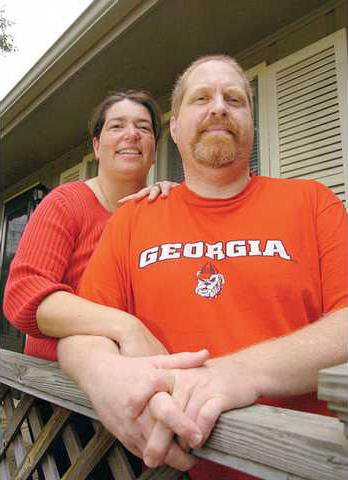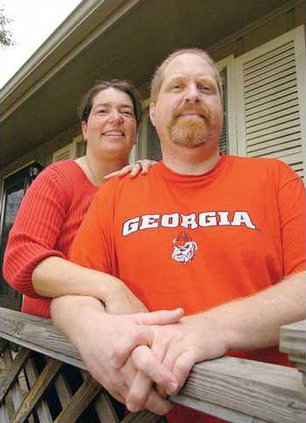Volunteers with the Ministry of Caring at First Baptist Church in Gainesville told Jennifer Tanner that because of increased pleas for assistance, it was a fluke that the program had funds available recently when she asked for help paying the power bill.
Tanner calls it a miracle.
When she called the Ministry of Caring, Tanner owed more than $500 to the power company after falling behind because her husband’s employer had cut back his hours.
"When we called them, they told us that it was actually a fluke ... I say a miracle — that they had funding they had just received, that they had been out of funding for quite some time," Tanner said.
Carolyn Wilmont also considers herself blessed to have found help.
Last month, her landlord gave her two weeks to either find her rent money or somewhere else to live.
She was led to Gainesville Action Ministries, which helped her pay the rent and avoid eviction.
"I would have gave up," Wilmont said tearfully. "But I made it though, with the help of the Lord. ... and I appreciate them."
Representatives from agencies like the ones extending help to the Tanners and Wilmont say they are having trouble keeping up with the increased need. That increased need also is marked by the rising number of calls to the United Way 211, a central phone number which connects agencies providing financial assistance with the people who need it.
Calls to United Way 211 typically spike during the winter and summer months, said Jackie Wallace, president of United Way of Hall County, but she said it is apparent that there are more people in need this year than last year. From January to July, the 211 Web site had 33 percent more visitors than it did in the first six months of 2007, she said. Of those who called 211 in the first six months of this year, 49 percent were from people needing some sort of financial assistance — a near 15 percent increase since 2007.
"While ... the need is consistently there, we have certainly seen a marked increase in the demand in the number of calls for that service," Wallace said.
Only a week ago, a call to United Way’s 211 help line showed that none of the agencies providing financial assistance to those needing help with utility payments had any money to give. This week, there were a few agencies that 211 found could help, and of those, most had strict requirements for their beneficiaries.
"That’s one of the most serious issues is there are not a lot of funds available right now, and they’re used up so quickly because the demand is so high," Wallace said. "It’s just there are more people than they have funds available — there’s more need. It’s a serious problem."
These days there are so many people calling the Ministry of Caring at First Baptist Church for help that Judy Furlow, who works in the ministry, said she cannot keep up.
"I can only answer so many," she said.
The Ministry of Caring gives a maximum of $150 to people who need help with utility bills. Since the beginning of the year, Furlow said she hears from more struggling single parents, those fighting inflation on fixed incomes and those whose hours have been cut by employers seeking to trim expenses.
Tanner’s utility payments had fallen behind after the local food processing plant where her husband, Paul Tanner, works cut his hours to less than 40. She said it got hard to juggle higher energy bills and make child support payments on a compromised income.
"(The money) goes very quickly, and every time my husband gets paid, it brings us to tears when we sit here and we go ‘Gosh, we were supposed to pay this, what are we going to do now? Let’s call and see if they’ll give us some extra time to pay this one,’" 32-year-old Jennifer Tanner said. "It’s basically robbing Peter to pay Paul every pay check until somebody just gets fed up with it and cuts it off."
Some people who can’t find help are getting cut off. Last week, spokespeople for local utility companies Georgia Power and Sawnee EMC said they have had to disconnect about 10 percent more of their customers for nonpayment this year than in previous years.
Now that there are so many people like the Tanners calling for help with utility bills, Furlow said she has to prioritize, giving the money to those whose need is most immediate.
"It’s just a real sad situation right now, and a lot of people, I think, are hopeless and you have to encourage them, you know, (tell them) ‘you can’t give up,’" said Furlow at First Baptist Church. "There’s sometimes people will just say, ‘You know what? I’ve never been like this and I just feel like giving up.’"
A woman who takes calls at the United Way’s 211 help line said it’s a lament she often hears: "‘This is the first time I’ve called, and I just don’t know what to do,’" she said.
Wilmont, who lives on a fixed income, she said that last month was the first time she had to ask for help in 12 years at her Davis Street apartment.
"This was something that happened. I was sick and had to get my medication," Wilmont said.
Two monthly checks usually cover her rent, utilities and food. But an unforeseen illness meant she had to pay some $30 for her prescription medication, leaving her that much short on her $102 rent. A call to United Way 211 led her to Gainesville Action Ministries, which paid the balance of her rent and kept her from getting evicted.
With so many people in dire straits, Tanner said she felt blessed to get the help she needed from the Ministry of Caring.
"I wanted to scream, jump up and down (when we got the help)," Tanner said. "We’ve been turned down by so many, because they don’t have the money and when we call them, we get the answering machine saying ‘I’m sorry, we’re out of funding, call back on this day.’"
In the past, the First Baptist Church ministry hardly ever ran out of funds, Furlow said. But the ministry, which runs on donations, has run out of money three times this year. After running out of money in May, the ministry was able to help people again in August, but those funds only lasted two and a half weeks, Furlow said.
It only took three days for the help funds allotted for the entire month of October to run out at the United Methodist Children’s Home.
The group grants between $50 and $75 to help families with minor children pay rent, utility and prescription drug bills. United Methodist Children’s Home opened its Hall County office in July, but families flooding the agency for help means the monthly allotment never lasts long, case aid Tondra Stiles said. She said more people have been calling the group since September and following through with their scheduled appointments. Five or six people who have been referred from their electric companies call the Children’s Home every day asking for help, Stiles said.
Already this month, the ministry gave grants to 13 families who needed assistance, and referred another 20 who were ineligible for its funding to other agencies. And they can’t always help those who are eligible.
The October crisis fund of $833, the monthly allotment from the North Georgia Conference of the United Methodist Church, only lasted United Methodist Children’s Home three days.
"Now our waiting list is so long for November that I worry that the people who call in November won’t be able to get an appointment, because we’ll ... spend all of our funds with just the people on our waiting list at this point," Stiles said.
People also already are calling Ninth District Opportunity to get help through that agency’s energy assistance programs. Since spring, there also are more people who have gone to agency needing help finding employment or assistance with utility or rent payments, Program Director Brenda Dalin said. Many of them leave empty-handed because that agency, too, is short on funds.
"We don’t often have money, so that plea usually goes unanswered," Dalin said.
The federally funded agency has had a "great" increase in the number of people needing food, also.
"That’s been a problem in some of our counties that we serve; the food pantries have started running out of food," Dalin said. "We have to do a lot more drives to get the pantries replenished."
Ninth District Opportunity will not have funding available for energy bill assistance until November, said Dalin.
On Nov. 3, those aged 65 and older can apply for assistance with the agency, and all others will be eligible Dec. 1, Dalin said.
"We will keep that program open until all our funds are expended," Dalin said.
Dalin said she is hopeful that those funds will last until January, since Congress appropriated more money for energy assistance programs this year.

